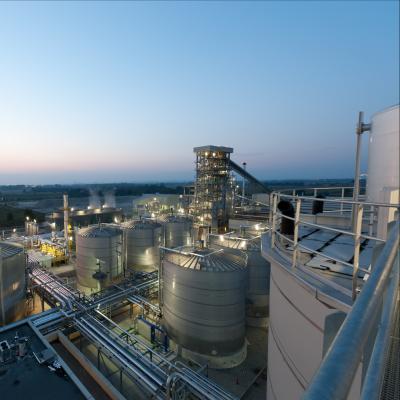
Following its 2024 call for proposals, CBE JU has now signed grant agreements with 30 projects. The funded consortia, made of a total of 416 beneficiaries from 33 countries, will develop innovative bio-based solutions at scale to reduce Europe’s reliance on fossil resources, create green jobs, and drive sustainable economic growth.
Chosen from a large pool of high-quality proposals, the selected projects will receive a total of €197.5 million to drive the development of new innovative circular bio-based consumer products and industrial solutions with four different types of actions:
- Two flagship innovation actions will receive nearly €40 million in funding to build first-of-its-kind industrial biorefineries in Europe.
- 15 innovation actions will get a total of €109.5 million to support the scaling up of prototype bio-based solutions.
- 10 research and innovation actions have been granted more than a total of €38 million to explore the potential of new or improved solutions through research and technology developments in laboratory or controlled setting.
- Three coordination and support actions will benefit from almost €10 million to help support strategic activities of the CBE JU, as the new working group on primary producers and the CBE JU widening participation strategy.
Together, these projects will play a critical role in delivering on the goals of the CBE JU Strategic Research and Innovation Agenda (SRIA), building a competitive, resilient and sustainable bioeconomy for Europe.
These 30 newly signed projects mark another step forward in Europe’s transition to a circular and sustainable bio-based economy. By investing in innovation across sectors and regions, we are not only reducing our dependence on fossil resources but also boosting European competitiveness, creating quality jobs in rural areas, and building resilient value chains. I am proud to see small companies, large industries, researchers, and primary producers joining forces to deliver tangible solutions for a greener future.
Nicoló Giacomuzzi-Moore, CBE JU Executive Director
Interest in the 2024 call was particularly high, with 298 proposals submitted - an 84% increase compared to the previous year. In total, applicants requested over €1.4 billion in funding across 18 topics, reflecting the growing momentum behind Europe’s bio - based transition. Around half of the beneficiaries are newcomers who have not previously received funding from CBE JU or its predecessor, the Bio-based Industries Joint Undertaking (BBI JU). This strong participation from new players reflects the effectiveness of the programme’s outreach efforts and its commitment to inclusiveness. Among these first-time beneficiaries, nearly two out of three are private companies, indicating sustained and growing interest from the private sector in the circular bioeconomy. In addition, small and medium-sized enterprises account for 31% of all beneficiaries of the 2024 call, confirming the continued appeal of the CBE JU programme as a valuable driver of innovation and growth.
Among the projects funded, flagship projects aim to build two large scale biorefineries to transform food waste and underutilised marginal lands into valuable resources for Europe’s bioeconomy.
CERISEA has been granted almost €20 million of the CBE JU funding to build a first-of-its-kind bio-based chemical production plant that transforms food waste into bio-based plastics and resins. By developing a stable, cost-effective and low-waste process, CERISEA aims to boost Europe’s bioeconomy, reduce reliance on fossil resources, and reinforce supply chain resilience.
RUNFASTER4EU will receive €19.9 million to help turn Europe’s marginal lands into productive assets by cultivating oil crops that regenerate the soil and supply biomass for the bioeconomy. The project is building a sustainable value chain that transforms these crops into high-value bio-based products, ranging from cosmetics and bioplastics to feed ingredients and green agrochemicals.
CBE JU funding will also support the development of sustainable bio-based solutions across various sectors, including packaging, food, cosmetics and chemicals. These innovations will help reduce Europe’s reliance on fossil resources, lower greenhouse gas emissions and promote circular economy practices. In parallel, some projects will boost resource efficiency and support rural actors, strengthening regional collaboration and cross–border cooperation in Europe.
UNICO2RN will receive €7.5 million to transform biogenic CO2 into sustainable bio-based materials. The project focuses on converting the captured CO2 into microbial proteins, biodegradable polyesters and amino acids through fermentation, offering a sustainable alternative to fossil-based feedstocks. By improving efficiency and reducing energy consumption by up to 80% in the production process, UNICO2RN will also aim to lower greenhouse gas emissions by 75%, supporting the EU's climate neutrality targets.
Backed by €7.5 million, CleanAlgae2Value aims to develop a modular biorefinery system to extract valuable compounds like proteins, oils, and pigments that transforms white microalgae into cost effective, carbon neutral ingredients for food and packaging. The objective is to create 15 commercially ready prototypes, while engaging the public and ensuring market uptake.
WoodTreat obtained €3.5 million to design sustainable solutions for recycling chemically contaminated wood waste. The project uses a multi-dimensional cascade approach to identify and remediate hazardous post consumer wood, aiming to reduce harmful environmental impacts and promote the production of safe products from recycled wood, minimising the need for incineration and landfilling.
MYCOCIRCLE will benefit from €3.5 million to develop sustainable alternatives to animal derived ingredients used in cosmetics and agrochemicals. The project upcycles mushroom biomass to produce bio - based materials, like chitin and squalene, aiming to reduce environmental impact, improve resource efficiency and offer ethical solutions that can replace ingredients traditionally sourced from animals.
RootLinks has been awarded €3 million to empower European primary producers to take a more active role in the circular bioeconomy by improving access to knowledge, training and funding opportunities. The project fosters collaboration across sectors and allows primary producers to adopt innovative business models. RootLinks will support the CBE JU working group on primary producers to ensure their full inclusion in the value chains, boosting bioeconomy in rural and coastal areas.
Explore the complete list of funded projects and learn more about all the initiatives.
A new call for project proposals, with €172 million in funding, is currently open across 13 topics. The submission deadline is 18 September 2025, 17:00 Brussels time.